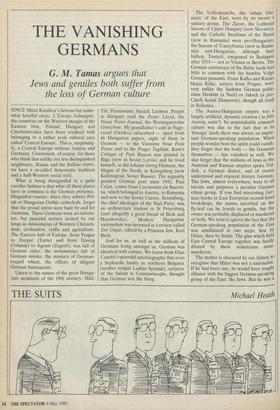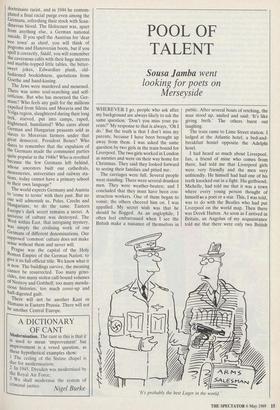THE VANISHING GERMANS
G. M. Tamas argues that
Jews and gentiles both suffer from the loss of German culture
SINCE Milan Kundera's famous but some- what fanciful essay, L'Europe kidnappee, the countries on the Western margin of the Eastern bloc, Poland, Hungary and Czechoslovakia have been credited with belonging to a rather posh cultural area called 'Central Europe'. This is, surprising- ly, a Central Europe without Austria and Germany. Convenient, of course, for those who think that unlike our less distinguished neighbours. Russia and the Balkan states, we have a so-called democratic tradition and a half-Western social style.
What is being disregarded in a quite cavalier fashion is that what all these places have in common is the German presence. Misguided tourists, when they admire Pol- ish or Hungarian Gothic cathedrals, forget that the proud spires were built by and for Germans. These Germans were no colonis- ers, but peaceful settlers invited by our kings as missionaries of Western Christen- dom, civilisation, crafts and agriculture. The Eastern half of Europe, from Prague to Dorpat (Tartu) and from Danzig (Gdansk) to Agram (Zagreb), was full of German cities, the monasteries full of German monks, the markets of German- reaped wheat, the offices of diligent German bureaucrats.
Listen to the names of the great Hunga- rian architects of the 19th century: Hild, Ybl, Hauszmann, Steindl, Lechner. People in Hungary read the Pester Lloyd, the Neues Pester Journal, the Westungarischer Grenzbote. My grandfather's café in Nagy- varad (Oradea) subscribed — apart from 46 Hungarian papers, eight of them in German — to the Viennese Neue Freie Presse and to the Prager Tagblatt. Kant's Critique of Pure Reason was printed in Riga (now in Soviet Latvia) and he lived himself, as did Johann Georg Hamann, the Magus of the North, in Konigsberg (now Kaliningrad, Soviet Russia). The arguably greatest German poet since 1945, Paul Celan, comes from Czernowitz (in Bucovi- na, which belonged to Austria, to Rumania and now to the Soviet Union). Rosenberg, the chief ideologist of the Nazi Party, was an architecture student in St Petersburg (and allegedly a good friend of Blok and Mayakovsky). Modern Hungarian nationalism was invented in a review called Der Ungar, edited by a Prussian Jew, Karl Beck.
And for us, as well as the millions of Germans living amongst us, German was identical with culture. We know from Elias Canetti's splendid autobiography that even a Sephardic family in northern Bulgaria (mother tongue Ladino Spanish), subjects of the Sultan in Constantinople, thought that German was the thing.
• The Volksdeutsche, the 'ethnic Ger- mans' of the East, were by no means a unitary group. The Zipser, the Lutheran Saxons of Upper Hungary (now Slovakia), and the Catholic Swabians of the Banat (now in Rumania) were pro-Hungarian, the Saxons of Transylvania (now in Ruma- nia) anti-Hungarian, although their bishop, Teutsch, emigrated to Budapest after 1919 — not to Vienna or Berlin. The German aristocracy of the Baltic lands had little in common with the humble Volga German peasants. Franz Kafka and Rainer Maria Rilke, writers from Prague, were very unlike the Sudeten German politi- cians Henlein (a Nazi) or Jaksch (a pro- Czech Social Democrat), though all lived in Bohemia.
The Austro-Hungarian empire was a largely artificial, dynastic creation ('tu felix Austria, nube). Its unmistakable common culture was due to the fact that in its 'foreign' lands there was always an impor- tant German-speaking population. When people wonder how the spirit could vanish, they forget that the body — the Germans themselves — has vanished as well. We also forget that the millions of Jews in the Austrian and Russian empires spoke Yid- dish, a German dialect, and of course understood and enjoyed literary German. The Jews, almost everywhere, were to all intents and purposes a peculiar German ethnic group. If you find interesting Ger- man books in East European second-hand bookshops, the names inscribed on the fly-leaf can be Jewish or gentile, but the owner was probably displaced or murdered or both. We tend to ignore the fact that the German-speaking population of the East was annihilated in two steps: first by Hitler, then by Stalin. The glue whiCh held East Central Europe together was fatally diluted by these industrious mass -
murderers.
The matter is obscured by our failure to recognise that Hitler was not a nationalist. If he had been one, he would have sought alliance with the biggest German-speaking group of the East: the Jews. But he was a doctrinaire racist, and in 1944 he contem- plated a final racial purge even among the Germans, refreshing their stock with Scan- dinavian blood. The Holocaust was, apart from anything else, a German national suicide. If you spell the Austrian for 'dear wee town' as shtetl, you will think of Pogroms and Hanoverian boots, but if you Spell it correctly, Stadd, you will remember the cavernous cafés with their huge mirrors and marble-topped little tables, the bitter- sweet jokes, Edwardian plush, old- fashioned bookishness, quotations from Goethe and hand-kissing.
The Jews were murdered and mourned. There was some soul-searching and self- criticism. But who has mourned the Ger- mans? Who feels any guilt for the millions expelled from Silesia and Moravia and the Volga region, slaughtered during their long trek, starved, put into camps, raped, frightened, humiliated? Who cares about German and Hungarian peasants sold as slaves to Moravian farmers under that great democrat, President Benes? Who dares to remember that the expulsion of the Germans made the communist parties quite popular in the 1940s? Who is revolted because the few Germans left behind, Whose ancestors built our cathedrals, monasteries, universities and railway sta- tions, today cannot have a primary school in their own language? The world expects Germany and Austria to 'come to terms' with their past. But no one will admonish us, Poles, Czechs and Hungarians, to do the same. Eastern Europe's dark secret remains a secret. A universe of culture was destroyed. The West within East, that intriguing mystery, was simply the civilising work of our Germans of different denominations. Our supposed 'common' culture does not make sense without them and never will.
Prague was the capital of the Holy Roman Empire of the German Nation, to give it its full official title. We know what it Is now. The buildings survive, the meaning cannot be resurrected. Too many geno- cides, too many stolen calf-bound volumes of Nestroy and Gotthelf, too many menda- cious histories, too much cover-up and half-digested guilt. There will not be another Kant or Hamann in Eastern Prussia. There will not be another Central Europe.



















































 Previous page
Previous page